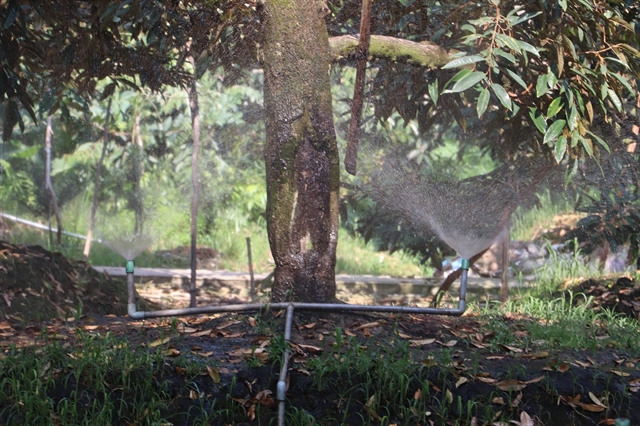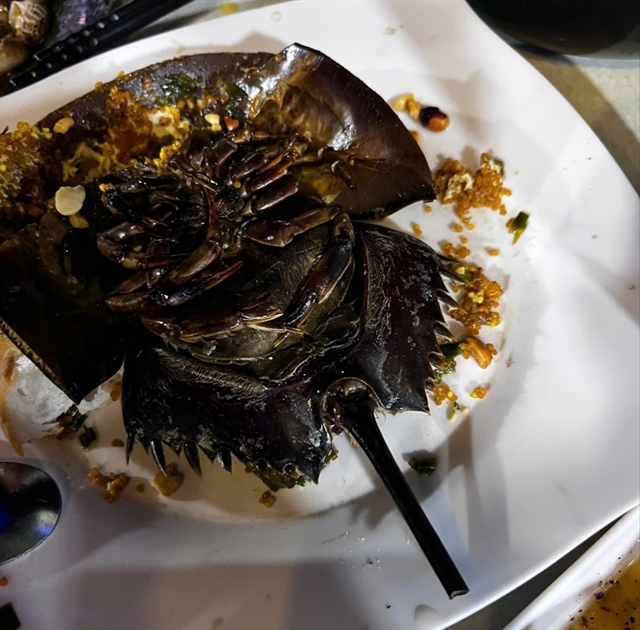 Society
Society


|
| The Mỹ Thành Nam Co-operative in Tiền Giang Province’s Cai Lậy District harvests its summer - autumn rice crop. – VNA/VNS Photo Minh Trí |
TIỀN GIANG – Tiền Giang Province has been strengthening linkages among various stakeholders in agricultural production to ensure sustainable development.
The Cửu Long (Mekong) Delta province has approved financial and other forms of support for 97 linkage projects and plans for the 2021-25 period.
Of them, 16 projects and 20 plans are currently underway at a cost of VNĐ154.7 billion (US$6 million), with VNĐ24.1 billion ($950,000) provided by the province, according to the Sub-department of Rural Development.
Võ Văn Lập, its head, said stakeholders participating in these projects would have access to support policies, including consultancy, to set up projects and financial assistance for purchasing machinery and facilities.
Participants would also benefit from the transfer of advanced technologies and additional support to develop sustainable linkages, he said.
"Companies and co-operatives involved in these linkages are guaranteed a steady supply of high-quality input materials, while farmers are assured of a stable market for their products," he promised.
“These linkages will ensure the production of clean, safe agricultural produce with clear origins and create jobs.”
The province has successfully implemented several effective linkage models.
For instance, three co-operatives in Gò Công Đông and Gò Công Tây districts have formed a partnership to grow clean vegetables to Vietnamese good agricultural practice standards.
They include the Tân Đông Safe Vegetable Co-operative in Gò Công Đông, and the Phú Quới and Thạnh Hưng Safe Vegetable Co-operatives in Gò Công Tây.
Together, they produce three to four tonnes of vegetables daily, supplying supermarkets, restaurants and export markets in Japan and the EU.
Fruit co-operatives in the province have partnered with companies and fruit trading establishments to ensure stable outlets and prices for their members.
Tiền Giang, the country's largest fruit-producing province, has over 84,000 hectares of fruit orchards that yield 1.8 million tonnes annually.
The province is known for its speciality fruits like Hoà Lộc mango, grapefruit, durian, milk apple, pineapple, and dragon fruit.
Nguyễn Thành Hiển, director of the Trade, Services and Agriculture Co-operative in Tân Phước District, said his co-operative had a farming contract with the Minh Hùng pineapple trading establishment, ensuring a steady market for their produce.
“Our members receive VNĐ500 per kilogram more than the market price, and they are very pleased with the higher income.”
Relevant provincial departments are implementing support policies to strengthen these linkages.
The Department of Agriculture and Rural Development is promoting the production of OCOP (One Commune - One Product) items through linkages between various stakeholders.
These products will receive marketing and branding support, enhancing their visibility and market value.
The department is also assisting co-operatives to build operational capacity, enabling them to better serve as a bridge between farmers and companies.
The province is encouraging investment in concentrated farming areas that produce high-quality products with traceable origins and robust stakeholder linkages.

|
| A durian orchard is equipped with an automatic spray irrigation system in Tiền Giang Province’s Cai Lậy District. Durian farmers in the province have adopted efficient irrigation methods to save water and cope with saltwater intrusion up rivers. – VNA/VNS Photo Minh Trí |
Rice production initiatives
Many rice companies in Tiền Giang have established partnerships with farmers and co-operatives to produce high-quality rice that meets export standards.
HK Trading Company Limited, based in Mỹ Tho City, collaborates with co-operatives to cultivate rice on pooled fields in Gò Công Đông, Gò Công Tây, Cai Lậy Town, and Gò Công City.
Châu Minh Hải, the company's director, said: “We are implementing linkages to grow 1,800 to 2,000 ha of rice per crop.
“Farmers are taught organic farming methods, and we assist them with soil improvement, crop care, and proper fertilisation.”
The Mỹ Qưới Agricultural Service Co-operative, in collaboration with the Phước Lộc Thiên Hộ Company Limited in Cái Bè District’s Hậu Mỹ Bắc B Commune, cultivates 100 ha of rice using organic and high-tech methods.
Their two rice varieties, ST24 and Nàng Hoa 9, have been recognised as four-star OCOP products.
Tiền Giang has over 54,000 ha under the grain and produces around 800,000 tonnes of paddy annually.
Though its rice growing area has shrunk, productivity and quality have improved thanks to advanced farming techniques and mechanisation.
Yields have increased by 1.2-2.2 tonnes per hectare per crop from five years ago.
The province has also developed brand names for high-quality rice varieties, such as Gò Công rice, VD 20, Nàng Hoa 9, OM 4900, and OM 5451, enhancing their market value and competitiveness.
It is implementing a national project to develop one million hectares of high-quality, low-emission rice cultivation, contributing to green growth in the delta, by 2030.
Trần Hoàng Nhật Nam, the department's deputy director, said the project focuses on key rice-growing areas like Cái Bè, Cai Lậy, Tân Phước, Gò Công Đông, and Gò Công Tây districts, Cai Lậy Town and Gò Công City.
These places will cultivate 22,100 ha by 2025, increasing to 29,500 ha by 2030.
The project will train 20,000 farmers in sustainable rice farming techniques such as reducing seed use to 80-100 kg per hectare and water, pesticide and fertiliser use by 20 per cent compared to traditional methods.
Sensor-based water monitoring systems will be installed to manage irrigation effectively.
All rice-growing areas under the project will cover at least 50 ha and be cultivated through linkages between companies, co-operatives and farmer groups.
The province is also investing in rice processing to enhance quality for exports, assisting 15 companies to improve processing capacity.
With 500 rice milling companies, Tiền Giang exports nearly 200,000 tonnes of rice annually. – VNS




